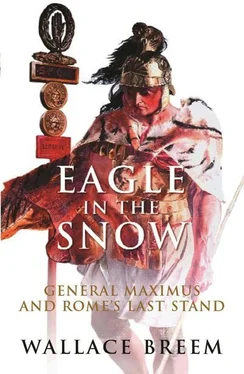Wallace Breem
EAGLE IN THE SNOW
A Novel
For Rikki, for whom it was written
In the deep valleys between the black rain-lashed mountains of the western coast there is little to do of a winter’s night if you belong to a beaten people. Defeated, sick-at-heart and afraid, you sit huddled in a tattered cloak round the great spluttering fires and dream of a to-morrow that will never come. The women nurse their wailing children and long for warm huts and a world in which milk is always plentiful; the young warriors sharpen their dulled spears and pray for just one victory against the men from the sea; while the old remember a time when no fires betrayed a burning village to the night sky, and there was peace in the lands from which they are now exiled for ever.
The talk of to-morrow dies away with the sparks blown from the hot ash and tales of the past are recounted by the elders of the tribe. Despair and fear recede a little into the darkness and curiosity and hope take their place as the well-loved stories are told again for the hundredth time. Perhaps a fresh tale is told by an old man whom no-one knows, and the defeated listen in silence. They hear of the great conspiracy beyond the Wall and of a man with no hair, who had the misfortune to become a god. They hear of the soldier who carried an emperor’s message across half Europe in his severed hand; and, for the first time, they hear too of how the last of the Eagles was destroyed by a river of ice.
YOU THINK I am lucky because I am old, because I knew a world that was not turned upside down. Perhaps you are right. As you, too, might have been lucky if the ice had only cracked. You don’t really know what I am talking about, do you? Well then, listen to me and I, Paulinus Gaius Maximus, will tell you.
I was born and brought up in Gaul, though my ancestors came from Rome herself. As a young child I lived on the outskirts of military camps and, from the very first, my life was regulated by the trumpets that roused the soldiers in the morning and told them when to sleep at night. Then, when I was six, my father was asked to give up command of the Second Flavia at Moguntiacum, and retired to his villa near Arelate.
We were a large household as I remember it. I had a cousin, Julian, who was brought up with me. His father, Martinus, had been head of a province, but later he became Vicarius of his native Britannia. He was a just man, and was liked by everyone; but he fell foul of a usurping emperor and found himself proscribed. My aunt was with Martinus when he heard the news that he was to be arrested. She took the knife and stabbed herself first. And then she held it out to him, all bloody in her hands. “See,” she said. “It does not hurt, Martinus.” My father told Julian this when he was old enough to understand. He wanted Julian to be proud of his parents and to know what fine people they had been. But it was a mistake; it did not make Julian proud; it only taught him to hate. But that came later. At lessons or at play we were inseparable, and like all children we planned to do great things to help Rome when we were grown men. We were like brothers.
When I was thirteen my father was appointed Legate of the Twentieth Valeria, stationed in Brittania. He owed this to the young Caesar, Julian, who, like us, worshipped the old gods.
The day we left Gaul there was an eclipse of the sun. It was uncanny the way the brightness vanished and the day turned into night. It was like the end of the world. Julian shivered, I remember, and said that to sail on such a day would bring bad luck. But my father sacrificed a cock and decided the omens were good. So we went on with our journey.
When old enough, we went into my father’s legion as equestrian tribunes. We were initiated into the mysteries of our faith in the same temple and on the same day. Together we took the sacred oath: ‘In the name of the God who has divided the earth from the heavens, the light from the darkness, the day from the night, the world from chaos, and life from death….’ And together we came out into the sunlight, carrying the words of our God upon our shoulders. Those were the good times, for we did everything together. We learned to be soldiers at Deva and I learned, too, something that was fast dying out, to take a pride in the legion of which I was a member. In my great-grandfather’s day the legions had been the shock troops of Rome; the best disciplined and the best fighters. But under Diocletian things had changed. A new field army began to grow up, consisting of auxiliary regiments made up from provincials and even barbarians willing to accept Rome’s service. Cavalry became all the fashion and the legions dwindled into becoming mere frontier troops. But here in Britannia the three legions still mattered, and I was glad. I was sorry when the time came for me to leave because it meant parting with Julian who was to remain on my father’s staff. It was three years before I saw him again.
I did a tour of duty with the Second Augusta at Isca Silurium and then was sent to our army headquarters at Eburacum. There I spent my time doing administrative work, worrying over accounts, pensions, and burial funds. It was dull work.
One day Fullofaudes sent for me. He was the new Dux Britanniarum; an Aleman from the banks of the Rhenus.
“A part of the Legion at Deva has tried to mutiny,” he said. “The rebellion has been put down and the ring-leaders arrested. You will go to Deva at once with reinforcements and take charge until I have appointed a new commander.”
I looked at him in astonishment.
“The Legate is dead,” he said, harshly. “I am sorry.”
He picked up a roll of documents from the table. “Three days ago we caught a slave carrying these. They contain details about this plot—and others as well. It is full of names. Much too full of names.”
“Dead,” I said. I could scarcely hear him.
“The disaffection is widespread. Too many are involved. Too many think that the province should break with Rome.”
“They can be arrested and executed.”
“No. To go further into this affair would do no good. I should have few officers and no men left.” He looked at me hard. “No-one will be executed,” he said. “Do you understand?”
He gave me a roll of sealed script. “Here are your orders and your authority. As for these—” He bent to the table, picked up the documents and flung them into the fire. “I do not believe that this province should separate from Rome. I want no martyrs whose memories can inflame the dissatisfied. But I do need time to build up loyalty. Do you understand now?”
“Yes,” I said. But I didn’t really. I only understood that my father was dead.
I reached Deva a week later. I paraded the legion and they stood for two hours in the rain before I came to them. Decimation was the punishment they expected and they were grey-faced and full of fear. Only at the end when they were wet with suspense did I say that there would be no executions. In their relief they cheered me and I dismissed them. I was hoarse with speaking. I went into the Legate’s quarters—my father’s quarters—and there the eight ringleaders were brought to me in chains. Five were tribunes and three were centurions. The anger of the parade ground had gone. I felt nothing now except a great coldness.
“You will not be executed,” I said. “But you are convicted of treason and deprived of Roman citizenship by order of the Vicarius. Your status is now that of slaves and as slaves you will be treated. Those of centurion rank will go to the lead mines at Isca Silurium where you will work for Rome till you die. As for the rest—since you have a taste for fighting your own kind, you will have a chance to gratify it further. You will go to the gladiatorial school at Calleva and afterwards be matched against each other in the ring. You may, if you are lucky, survive five years.”
Читать дальше













